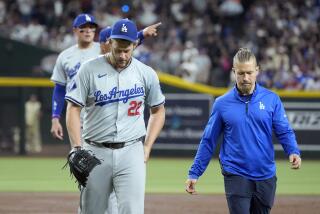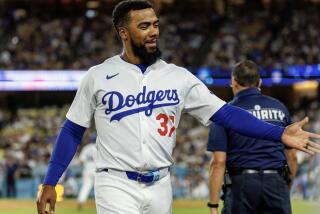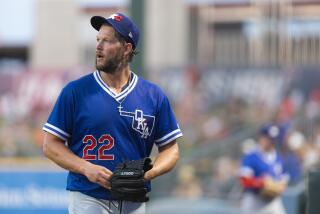He Was a Workhorse Warhorse, Very Few Are Left
The No. 53 that he wore with such distinction has already been retired by the Dodgers--along with his role, essentially.
Don Drysdale was both workhorse and warhorse. There are few remaining--anywhere.
The right-hander known as Big D started 36 or more games in nine of his 14 seasons, and started 40 or more in five. He threw 300 or more innings in four straight seasons starting in 1962, and is credited with pitching almost 10 years without missing a turn.
“Don and Sandy (Koufax) were the leaders of our staff,” Dodger pitching coach Ron Perranoski, the club’s closer through the early 60s, said. “They pitched every fourth day and thrived on it.”
While winning four National League pennants from 1959 through ‘66, the Dodgers used a four-man rotation, sometimes a three-man. Koufax started 40 or more games three times. Johnny Podres and Claude Osteen started 40, as did Don Sutton, Bill Singer and Andy Messersmith in the ‘70s. As recently as 1973, 37% of all baseball starts were made on three days’ rest, or less. A season of 38 starts was routine.
Now, 32 qualifies for workhorse status. Greg Maddux and John Smoltz led the National League with 35 each last year. Mike Moore and Rick Sutcliffe led the American League with 36 each. A “quality start” is defined as six innings, allowing three runs or fewer. The four-man rotation went out with love beads.
In reflecting on Drysdale’s career in the aftermath of his shocking death, there is this question: If they could do it then, why not now?
With three rounds of expansion since ’69 having contributed to the diluted pitching, with almost all of the 28 teams conducting a futile search for fourth and fifth starters, why wouldn’t the clubs dump the five-man rotations they are using and restore the four-man?
“We’ve talked about it, but habits die hard,” Perranoski said, meaning that young pitchers are conditioned to working on four days’ rest by the time they reach the majors.
“You can get away with (a four-man) for a while, but if one or two drop out after a month, you’re back where you started,” he said. “On our staff, (Tom) Candiotti could definitely pitch every fourth day, and Kevin Gross probably could. But (Orel) Hershiser couldn’t since his operation, and neither could (Ramon) Martinez. He’s pretty fragile.
“The other thing is that we were on year-to-year contracts in the ‘60s. If something wasn’t feeling right, we couldn’t afford to sit out or miss a turn. Now, with the long-term contracts, guys want the extra rest to extend their careers, and their agents insist on it. I mean, we used to have guys throw 30 minutes of batting practice between starts. They might even get on a mound twice in the three days they had off. Tell a pitcher to do that now and you might get sued.”
Perranoski also cited the increase in youth baseball, saying youngsters are putting more stress on undeveloped arms, which takes a later toll, requiring more rest.
Angel Manager Buck Rodgers, trying to keep his team in the American League West race while conducting tryouts for fourth and fifth starters, disagreed with that, saying there are rules to protect young pitchers, at least, from throwing too much, and if anything, pitchers at the pro level are being overprotected.
“Randy Johnson threw 157 pitches for Seattle the other night and the writers asked me about it as if (Mariner Manager) Lou Piniella had butchered him,” Rodgers said. “You have a minor league mentality at the major league level now. If a guy throws 125 pitches, his agent is on the phone, screaming that he’s overworked. I mean it. I’ve had agents call and say I’m using their pitcher wrong. One agent said I’ve got to tell his pitcher what his role is. I told him that as soon as his pitcher did something, I’d give him a role.”
And it’s not just agents, Rodgers said. Team doctors often are caught in the middle, wanting to tell a pitcher that his twinge is nothing, that he can keep throwing, but nervous about protecting the club’s multimillion-dollar investment as well.
“There’s definitely not enough pitching and it’s going to get worse,” Rodgers said, alluding to future expansion. “There’s going to be more and more reliance on the Dominican and other Latin countries.
“A four-man rotation makes sense, and Whitey (Herzog) and I have talked about what it would take to do it. You’d have to start at the double-A level, reconditioning arms, getting guys to accept it mentally.”
What does it matter? Check the success of the Dodgers in the ‘60s and early ‘70s. If the Nos. 1 and 2 starters are each starting 38 games, instead of 32, that’s 12 starts that are now going to the No. 5 starter. Modestly, the difference could be 8-4 instead of 4-8.
It’s part of the Drysdale legacy, but times have changed. The Dodgers haven’t had a pitcher start 40 games since Messersmith in 1975, the same year that Doug Rau was the last to start 38. And the last great four-man rotation was the Baltimore Orioles’ in the late ‘60s and early ‘70s. Each of Baltimore’s 1971 starters--Jim Palmer, Dave McNally, Mike Cuellar and Pat Dobson--won 20 games.
George Bamberger, the retired pitching coach of that team, said pitchers are simply overprotected now and that teams “lack the guts” to change their routines and return to four-man rotations.
“There are more sore arms now because pitchers don’t throw enough,” he said. “The more you throw, the stronger your arm gets, but no one seems to understand that. They’re stupid. We had Jim Palmer throw, throw and throw some more after he had back and shoulder injuries and missed most of those two seasons (1967 and ‘68), and he went on to win three Cy Young awards. Now, guys think they have to recuperate in the trainer’s room. It’s ridiculous.”
It’s a different era for sure. Perranoski reflected on those less complicated years, on what he described as his admiration for Big D and the pride he experienced providing relief for Drysdale and the others when it was needed, and said they were all just “kids at heart.” They have lost one of the kids, and it’s not just the rotation that will never be the same.
ADD PITCHING
It’s not a situation created by surplus, but there are some big-name pitchers available. Frank Viola of the Boston Red Sox, Dennis Martinez of the Montreal Expos, Tim Belcher of the Cincinnati Reds and Greg Harris of the San Diego Padres can be had by a contender willing to part with prospects and take on a major salary, imminent free agency or both.
Kevin Gross of the Dodgers and Chuck Finley of the Angels could join the list in time. The San Francisco Giants and Toronto Blue Jays would like to cement their division leads with the acquisition of a proven pitcher, but there’s no rush. Each could put an early wrap on its division, then decide if one more pitcher is necessary for the playoffs.
Among high-salaried position players on the block are Fred McGriff, Danny Tartabull, Shane Mack, Bip Roberts, Chris Sabo, Kevin Mitchell, Charlie Hayes and any and all New York Mets, including Howard Johnson, Eddie Murray, Vince Coleman and Bobby Bonilla.
McGriff’s departure as part of the Padres’ fire sale is still expected any time now. The Atlanta Braves might have lost interest because of their reluctance to trade any of their blue-chip prospects but the Orioles are said to be still listening. The deal now is hinging on Baltimore’s willingness to include pitcher Anthony Rhodes in a package that might also include outfielder Damon Buford and first baseman David Segui.
“I know I’m going somewhere, and I just hope it’s to a contender,” McGriff said the other day. “I got spoiled when I was with the Blue Jays and we were always in the hunt.”
INSIDE TRADING?
Bud Selig, owner of the Milwaukee Brewers and chairman of baseball’s executive council, has whitewashed the dismantling of the contending Padres as simply a manifestation of the big- and small-market problem, but other owners are still steaming about the trade that sent Gary Sheffield to the Florida Marlins for the unproven Trevor Hoffman and two minor league pitching prospects.
The unhappiness stems from the belief by some clubs that they could have offered a better package for Sheffield but were thwarted by what would appear to be a conflict-of-interest association between Russell Goldsmith, one of the Padres’ minority owners, and Wayne Huizenga, owner of the Marlins.
Goldsmith is chairman of Republic Pictures, and Huizenga recently bought 65% of Republic. Thus, the two baseball competitors are also business partners, which Selig also sweeps under the carpet. His view is that baseball’s conflict rules have not been violated, since Goldsmith is only a minority owner.
MIDWAY
It means nothing, of course, but here are the award leaders at the All-Star break:
MVP--Barry Bonds in the National League and John Olerud in the American.
Cy Young--John Burkett in the National and Jimmy Key in the American.
Rookies--Mike Piazza in the National and Tim Salmon in the American.
Managers--Dusty Baker in the National and Buck Rodgers in the American.
Best Multiple-Year Free-Agent Signings of the Winter--1. Bonds, by the Giants; 2. Key, by the New York Yankees; 3. Randy Myers, by the Chicago Cubs; 4. Joe Carter, re-signed by Toronto; 5. Paul Molitor, by Toronto.
Worst Multiple-Year Free-Agent Signings of the Winter--1. Todd Worrell, by the Dodgers; 2. John Smiley, by Cincinnati; 3. Greg Swindell, by Houston; 4. Candy Maldonado, by the Cubs; 5. Steve Howe, by the Yankees.
SNUB
Cecil Fielder never seems to get the numbers he should in the All-Star and MVP voting, but he keeps piling up the performance numbers anyway.
His 76 RBIs as of Friday were one more than he had at the All-Star break last year, after which he went on to drive in 124 runs, following seasons of 132 and 133. He is trying to become the first player in major league history to lead his league in RBIs for four straight years.
His 23 homers as of Friday were also consistent with his pace of the three previous years with the Detroit Tigers, when he totaled 51, 44 and 35.
“I don’t know what more I can do,” Fielder said of his production, when asked about the All-Star vote in which he finished second to Olerud, who has challenged .400 for most of the first half and is near or in the lead in several other offensive categories.
Fielder was selected as a reserve on this year’s American League squad by Manager Cito Gaston after having been slighted by both the fans and league officials last year. He said he had no problems with Olerud’s election but still thinks there’s something wrong with the system, citing the case of teammate Mickey Tettleton, who was not added to the team after finishing fourth in the fan vote behind Texas Rangers catcher Ivan Rodriguez and despite being tied with Fielder for the league lead in homers and tied for second in RBI.
“It’s not a fair situation when you’ve got a guy like Mick, who’s the best at his position, finishing only fourth and not even being added to the team,” Fielder said.
“That kind of thing frustrates everyone involved. I mean, you’re always going to have disappointed people, because in the fan vote, the best ain’t the best. And for me, why have an All-Star game if you’re not going to have the best guys for the first half of the season in the starting lineup? I don’t like to see wrongdoing, and it’s wrong for Mick not to be in the game.”
NAMES AND NUMBERS
--Unseated: Ozzie Smith’s 10-year run as the National League’s All-Star starter at shortstop ended when Barry Larkin of the Cincinnati Reds won the fans’ vote. Larkin has the better statistics, but Smith’s aren’t bad.
At 38, he has 35 runs batted in, four more than he had all of last year. He has a .273 average, compared to .295 last year. He also has nine errors, only one fewer than last year and a disturbing pace for the defensive wizard, but St. Louis Manager Joe Torre said he was shocked by the All-Star vote.
“It’s a popularity contest, and who’s more popular than Ozzie?” he asked.
--Direction: They haven’t all been moved out during the beleaguered ownership of Tom Werner, but six former players with the San Diego Padres were selected to the All-Star squads--Gary Sheffield, Roberto Alomar, Dave Hollins, John Kruk, Joe Carter and Carlos Baerga.
--Sheffield Add: The Florida Marlins’ new third baseman is already frustrated by the lack of protection from Orestes Destrade and the number of times he is being pitched around.
“I don’t want to walk, but I don’t seem to have a choice,” Sheffield said. “I better get used to it. If I keep swinging at bad pitches I’ll keep walking back to the dugout.”
--Hot Hitter: Pitcher Bruce Ruffin of the Colorado Rockies doubled off Chris Hammond of the Marlins Wednesday night, ending a hitless streak of 69 at-bats dating to May 30, 1990. Ruffin now is 21 for 281 in his career.
Manager Don Baylor said, “the only thing I know is that he switch-hits. For whatever reason, that I don’t know. It’s beyond me.”
--Cooling Off: A sensational start has propelled Barry Bonds and his San Francisco Giants, but the reality is that he’s been a modest hitter since May 17, batting .271 through Thursday with 10 home runs and 35 RBIs in that span.
--Morning Glory: The 1:47 a.m. conclusion to the 20-inning game with the Dodgers, as well as the 4:40 a.m. conclusion to last weekend’s doubleheader with the Padres, had a benefit for Philadelphia relief pitcher Larry Andersen, ho said: “It’s the straightest I’ve ever walked at that hour of the morning.”
--Missing Link: At the All-Star break, the point can be made again that the Angels would be in the driver’s seat of the weird American League West race if they had protected Bryan Harvey in the expansion draft. Owners Gene and Jackie Autry thought they didn’t need to carry the remaining $10.25 million of Harvey’s contract, since they were in a rebuilding year and didn’t expect to be in the race. Then again, how could they be in the race without a closer?
With Harvey and his 24 saves headed for the All-Star game, the Angels’ bullpen through Thursday had blown eight of 30 save opportunities and had an 8-10 record with a 4.52 earned-run average. Of course, the Angels expected Joe Grahe to do a better job and hoped that minor league closing prospect Troy Percival, out for the season after elbow surgery, would be ready by mid-season.
More to Read
Are you a true-blue fan?
Get our Dodgers Dugout newsletter for insights, news and much more.
You may occasionally receive promotional content from the Los Angeles Times.









